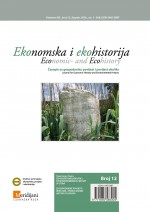Uskoks’ War Economy and the Making of the Early Modern Empire
Uskoks’ War Economy and the Making of the Early Modern Empire
Author(s): Isao KoshimuraSubject(s): Comparative history, Economic history, International relations/trade, 16th Century
Published by: Društvo za hrvatsku ekonomsku povijest i ekohistoriju - Izdavačka kuća Meridijani
Keywords: Uskok; Wako piracy; Early modern empire; Military Border; Vlach; War economy;
Summary/Abstract: The intention of the author is to make two articles, which could serve as a departure point for a comparative analysis of Uskoks and Wako piracy. In this, first, article, the author intend to discuss the case of Uskoks. He will address selected processes and phenomena from the history of Uskoks that can later be used as analytical units in the comparison of Uskoks and Wako. First, the author will question the relation of the Habsburg Empire with the neighboring powers as a basis for the comparison of the foreign policy of the Ming Empire. These two empires reached a major turning point and had the problem of the pirates in each in the latter half of the 16th century. Second, he will address the people called Vlachs. These were semi-nomadic cattle breeders who lived across the Balkans, who served in various imperial military units, and who made a large part of the Uskok population. The religious affiliation and ethnic background of Uskoks were rather complex, as well as in the case of East Asian pirates. Third, the author will discuss the policy of the Habsburg Empire towards the Vlachs, in order to compare the Habsburg policy with the Sea Ban policy of the Ming Empire applied to the Chinese marine commerce. Finally, based on reading and research, he decided to typify the activity of the Uskoks as the ‘war economy’ in order to later make a distinction with the case of Wako. Concerning the term ‘war economy’, this paper focuses on economic contingencies and activities in the state of war during the early modern transition period.
Journal: Ekonomska i ekohistorija - Časopis za gospodarsku povijest i povijest okoliša
- Issue Year: 2016
- Issue No: 12
- Page Range: 116-135
- Page Count: 20
- Language: English

